Faculty and staff from across UW–Madison’s School of Education are routinely quoted or make their voices heard in newspapers, magazines, and online news media outlets. Similarly, these experts are often interviewed and showcased on a range of local, national, and international radio and television news reports. Over the past year, there have been more than 100 School of Education-related media mentions. For the latest examples, visit: https://news.education.wisc.edu/in-the-media
Popular Science features Enright’s expertise on the psychology of forgiveness
Popular Science magazine in January featured the expertise of UW–Madison’s Robert Enright in an article headlined, “How to forgive someone who has hurt you — and why you should.”
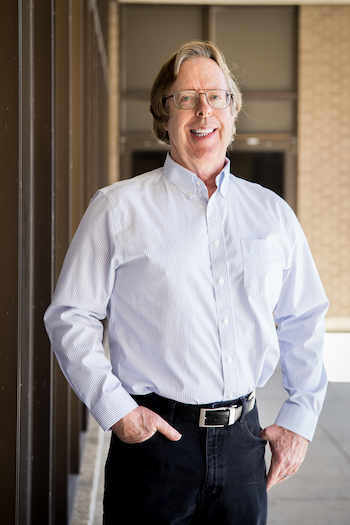
Enright, a professor with the School of Education’s Department of Educational Psychology, has been researching how forgiveness affects well-being at locations across the globe for more than three decades.
Popular Science explains that research on the topic suggests that living with anger can be harmful to both mental and physical health. However, forgiving someone can be more complicated than it sounds. The report notes how many are concerned that forgiving someone might mean letting an abuser back into their lives, or showing kindness to someone that doesn’t necessarily deserve it. Enright and other forgiveness scholars, though, consider forgiveness to be a conscious decision that is completely internal.
“Most people have used the word forgiveness all their lives,” Enright tells Popular Science. “We have these really harmful colloquial ideas about what forgiveness is.”
Enright goes on to explain that the key is to separate ideas of reconciliation and forgiveness. While reconciliation is a negotiation process meant to save or preserve something, forgiveness is a virtue that guides actions and is meant to provide relief.
Noting that forgiveness is a choice for people who have been deeply hurt by another, Enright has constructed a framework for teaching people how to forgive and developed it into a 20-step program. The program is divided into four phases: uncovering your anger, deciding to forgive, working on forgiveness, and discovery and release from emotional pain.
The first step towards forgiveness is deciding not to harm the person who hurt you, but it’s not about “hugging it out,” like colloquial ideas would suggest. It’s about letting go of a desire to hurt or demean that person somehow. “In the face of being harmed,” Enright says, “You’re choosing to do the opposite.”
Wang discusses her new book on STEM transfer students with Inside Higher Ed
Xueli Wang in March was interviewed by Inside Higher Ed for a report that examined her new book, “On My Own: The Challenge and Promise of Building Equitable STEM Transfer Pathways.” Wang is a professor with the School of Education’s Department of Educational Leadership and Policy Analysis, and her book follows 1,670 community college students over four years as they transfer to four-year institutions.

While the title suggests students succeed because of their own attitudes and actions, Wang explains to Inside Higher Ed that the meaning of “On My Own” is much more nuanced and multifaceted. Though most students featured in the book were “remarkably motivated and resilient,” Wang discovered that many received limited institutional support and faced numerous structural challenges.
Wang notes that some of the primary obstacles faced by STEM students include ambiguous relationships between courses and STEM majors, lack of clear course pathways that fit students scheduling needs, and the absence of financial support for transfer students. Wang tells Inside Higher Ed that many transfer students from low-income backgrounds are ultimately forced to make a difficult decision between transferring and work.
• Wang also spoke with Inside Higher Ed for a May 26 report headlined, “What Could a New Admissions Test Bring? Experts consider the implications of the University of California’s decision to create a new admissions test.
She tells Inside Higher Ed: “Frankly, I am a bit skeptical of the feasibility of developing or identifying yet another test that is supposed to remedy bias and flaws in standardized tests. The bigger question here is: How closely does the new test — or any reform to the admissions process — align with espoused values to advance diversity, equity and inclusion? The suspension of the SAT and ACT is a monumental step toward that, but much is left to be seen with regard to the potential new test.”
PBS NewsHour showcases efforts of Hillman’s family to convert little library into food pantry
Nick Hillman and his family were featured by “PBS NewsHour” for a May 10 segment headlined, “Little libraries become food pantries during COIVD-19.”
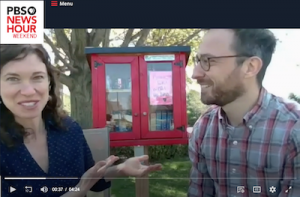
Hari Sreenivasan begins the PBS report by explaining: “When the coronavirus emerged in the U.S., people who share books on a small scale — and countless others who wanted to help their neighbors — saw a new need. Boxes and stands offering free household goods, food, and other supplies appeared with signs saying ‘take what you need.’ ”
Hillman is an associate professor with the School of Education’s Department of Educational Leadership and Policy Analysis, and serves as the director of the Student Success Through Applied Research Lab (SSTAR Lab).
NewsHour reports: “Now there’s a growing network of ‘sharing boxes’ nationwide and many began as part of the non-profit organization — Little Free Library. Part of the routine for the Hillman family in Cottage Grove, Wisconsin, is a daily walk and a visit to the Little Free Library they added to their front yard last summer.”
“We’d never heard of these until we moved to Wisconsin about six years ago, and a lot of neighborhoods that we’d been walking through and had seen around town would occasionally have a little free library and we were curious about what they were,” Hillman tells PBS NewsHour.
NewsHour reports that the “Hillman’s library is one of more than 100,000 of these book-sharing boxes installed around the world since the movement began in 2009. After the first few weeks of Wisconsin’s coronavirus stay at home order, the family wanted to be sure their little library box was still safe and meeting the town’s new needs.”
“We had books in the library and we just put a few cans of food in the library and then we noticed they were gone,” says Ashley Hillman. “So we thought, well, maybe there is a need here in our community.”
• Nick Hillman in February spoke with the Wisconsin State Journal for a report looking at issues related to dwindling enrollment and access to higher education for rural students at some Wisconsin campuses. The story utilized the expertise of Hillman and two of his graduate students, Jared Colston and Josh Bach-Hanson.
Hora speaks with newspapers across the nation about internships evolving during pandemic
Newspapers from across the country tracked down Matthew Hora to get his thoughts on reports that generally examined how internships were evolving during the COVID-19 pandemic.

Hora is the director of the Center for Research on College-Workforce Transitions, which is housed within the Wisconsin Center for Education Research. He is an assistant professor with the Department of Educational Policy Studies.
In a New York Times article from May 22, Hora speaks to the fear many students have that remote internships won’t be nearly as valuable as the traditional, in-person variety.
“You pick up a lot of subtle clues about how to behave in that profession, how to communicate like an engineer, how to work in teams like a nurse,” Hora tells the New York Times. “Students are going to be missing that.”
Similarly, Hora was quoted by The Washington Post in this June 8 report headlined, “Corporate America is taking the internship online this summer. Some experiences can’t be replaced.”
The Post noted that the novel coronavirus’s overall impact on internships and entry-level hiring could be huge.
“I think this will end up being a pretty devastating event for college students,” Hora said. He points to industries like manufacturing, skilled trades, and hard sciences where internships can’t easily go remote.
Hora was also quoted in a May 3 report from USA Today that’s headlined, “Summer internships canceled? Not at these companies embracing virtual versions.” The real challenge, according to the USA Today article, is adjusting the infrastructure of internships to suit virtual experiences.
“It’s going to be tough for some companies,” Hora told USA Today. “Converting to working remotely requires a bit of forethought as to how to design meaningful tasks and how to supervise them in a productive way.”
And even before the pandemic hit, The Chronicle of Higher Education reported on Feb. 12 about important research being conducted by Hora that examines a variety of issues related to internships. That article is headlined, “Why internships can ease the path from college to career — and why they often don’t.”
Wisconsin Public Radio utilizes expertise of Graue for report on preschool access
Wisconsin Public Radio (WPR) utilized the expertise of Elizabeth Graue in an April 22 report examining preschool access in the state.
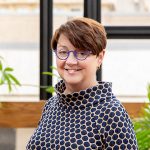
Graue is the Sorenson Professor of Early Childhood Education with the School of Education’s No. 1 Ranked Department of Curriculum and Instruction. She is also the director of the Center for Research on Early Childhood Education (CRECE).
The WPR report begins: “Wisconsin ranks fifth in the country for access to free preschool programs for 4-year-olds, with 72 percent of the state’s 4-year-olds enrolled during the 2018-2019 school year, according to the annual “State of Preschool” report from the National Institute of Early Education Research (NIEER). It didn’t, however, do as well in how much the state spends per child — Wisconsin ranked 34th, and spent $658 less per child, adjusted for inflation, in the 2018-2019 school year than it did in the previous year.”
The organization warned that the COVID-19 pandemic and resulting economic strain could cause states to fall farther behind on quality and per-child spending, as states have to freeze or cut spending to balance their budgets with less tax money coming in.
Before the pandemic closed schools across the state, Wisconsin was moving toward full-day 4K programs. Now, economic struggles will make this move harder.
“I think the argument can be made that with kids losing time now, that we want kids to have more robust programming,” Graue tells WPR. “But since we’re going to have to move money around, and the state’s going to take a big hit, I think that’s not something I’m going to hold my breath about happening.”
Graue added that school closures came at a particularly bad time in mid-March, when all the angles of development culminate in spring.
Go London puts spotlight on work of Abdu’Allah
Go London in March featured an in-depth report on Faisal Abdu’Allah and his work in the group exhibition, “Hogarth: London Voices, London Lives,” which aimed to depict the social conditions of London in 2020.
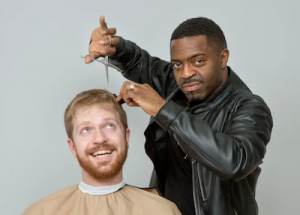
Abdu’Allah’s work in the exhibition, which Go London calls the main event, featured an actual haircut in a barber’s chair. An associate professor with the School of Education’s Art Department, Abdu’Allah is also an accomplished barber with over 30 years of experience.
Everyone who has their hair cut by Abdu’Allah had a “before” polaroid taken and displayed during the exhibition, alongside his tintype photographs of his tools, including his scissors, razors, and combs.
For Abdu’Allah, a haircut is more than just cutting hair. He tells Go London that he sees it as a performance, a social commentary, which can express moments in our lives and perform our identities in certain ways. One thing that Abdu’Allah loves about haircuts is that they aren’t permanent: “I think permanence makes people complacent, it means there’s no room for change … We can be transformed in a matter of minutes.”
In other reports …
• Gloria Ladson-Billings, a professor emerita with the School of Education, was interviewed by the Tampa Bay Times March 28 for a report examining how Florida and its schools are responding to the COVID-19 pandemic.
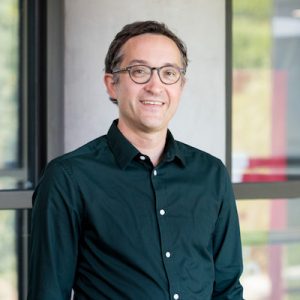
• Omar Poler (Sokaogon Ojibwe) was featured in the Wisconsin State Journal’s Feb. 29 report, “Know Your Madisonian: Bringing Indigenous Perspective to UW–Madison Campus.” As an American Indian Curriculum Services consultant for the School of Education, Poler supports education about and creates learning opportunities regarding First Nations. One of the primary programs he works on is the UW First Nations cultural landscape tour.
• Kurt Rose is a member of In Business magazine’s 2020 40 Under 40 class announced on March 3. The annual program honors 40 of the most successful and civic-minded young professionals under the age of 40 in the Greater Madison area. Rose is the School of Education’s human resources recruitment and retention specialist.
• The work of John Rudolph was noted in an April 23 report from The Washington Post headlined, “The scientific method can’t save us from the coronavirus: What we need is problem-solving — creativity, flexibility, and teamwork.” Rudolph, who chairs the School of Education’s No. 1-ranked Department of Curriculum and Instruction, is an expert on the history of science education in American schools. He is the author of the award-winning 2019 book, “How We Teach Science: What’s Changed, and Why It Matters.”
• An April 19 editorial from the Wisconsin State Journal makes note of some thoughts from UW–Madison’s Richard Halverson, the School of Education’s associate dean for innovation, outreach, and partnerships, and a professor with the Department of Educational Leadership and Policy Analysis. He also leads the School’s office of Professional Learning and Community Education (PLACE).
The editorial focuses on shifts in education from in-person to online as COVID-19 forces schools across the nation to close their doors. While this is an uncomfortable and difficult situation for many, others are looking at this as an opportunity to better understand technology. “In my world,” said Halverson, “there’s a lot of sadness and apprehension. But I’m looking at an emergence of an entirely new form of literacy for teachers and learners — technology-enabled learning literacy, which is kind of remarkable. It might be the next revolution in how we think about education.”
• Li Chiao-Ping and her dance company, Li-Chiao Ping Dance (LCPD), were featured in a Jan. 26 report in the Wisconsin State Journal. Li is a Vilas Research Professor with the School of Education’s Dance Department and is the founder of the LCPD.
• Isthmus published an article Feb. 27 featuring Lynda Barry and her latest book, “Making Comics,” which is “part memoir, part self-help, and a passionate call for introspection,” reports the Madison newspaper. Barry, a professor of interdisciplinary creativity with the School of Education’s Art Department, holds the Chazen Family Distinguished Chair in Art. She is widely known for “Ernie Pook’s Comeek,” which she published from 1979 to 2008. Since, Barry has written 15 books and was named a MacArthur Fellow.
• The Department of Kinesiology’s Jill Barnes spoke with Gizmodo for a May 25 report headlined, “How will our bodies change from being inside for months?” Barnes talks about “detraining” caused by decline in our daily physical activity during the global pandemic, and gives tips on how to combat this loss of muscle mass and strength, and cardiovascular and metabolic function, with short and frequent movement breaks.